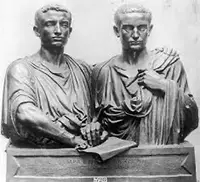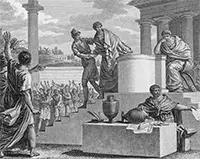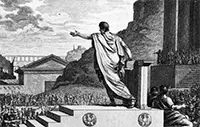Ancient Rome: the Gracchi
The Gracchi were brothers who tried unsuccessfully to enact agrarian and political reforms during the Roman Republic. 
Tiberius and Gaius Gracchus were born into a very well connected family. Their father, Tiberius Sempronius Gracchus, was a military veteran and a longtime politician, serving as consul for a time. Their mother, Cornelia Africana, was the daughter of Scipio Africanus, the general who defeated Hannibal at the Battle of Zama, in 202 B.C., bringing about the end of the Second Punic War. Sources do not agree on the birth year of Tiberius, the older brother. He is thought to have been born sometime between 169 B.C. and 164 B.C. Like his father, he was a successful soldier, serving in the Third Punic War; some sources say that he was among the first to scale the walls of Carthage during the end of that war. Appointed a quaestor in 137 B.C., he engaged in the Numantine War, in Spain, and prevented a Roman catastrophe by convincing the Numantines to agree to a peace treaty. Several powerful people in Rome decried the action, arguing that it made Rome look weak, and the Senate refused to ratify the treaty. Also at this time, Tiberius witnessed firsthand the great disparity of wealth that punctuated the population of the Roman Republic.  Elected tribune of the people in 133 B.C., he introduced a proposal that no one be allowed to own land that exceeded 500 iugera (125 acres) and that anyone who did would have to turn over the excess to the Roman government, for distribution to the poor. (This was a reprisal of an earlier law that had been abandoned.) In that same year, King Attalus III of Pergamum died, leaving his fortune to the people of Rome. Tiberius floated the idea of using the money from King Attalus's distribution to buy up and land and give it to poor people. Not finding support, he took the funds and did the division himself. Tiberius had many friends in Rome; he also had many enemies. To protect himself amidst this turmoil, he declared his intention to be re-elected as tribune. This was technically illegal but only by precedent: Tribunes traditionally had served terms of one year only. His opponents charged that he was attempting a power grab and, further, that he wanted to become king. Despite several warnings of impending danger, Tiberius went to the Senate and tried to plead his case. Arguments between his supporters of his opponents turned violent, and Tiberius and nearly 300 of his supporters died in the fighting. Tiberius had set up a land reform commission, and this continued to function, although the Senate curtailed its powers and functions. Ten years later, Gaius Gracchus, the younger brother of Tiberius, was elected a Tribune of the Plebs, following in his brother's footsteps. He revived his brother's agrarian reform program and succeeded where his brother failed by Like his brother before him, Gaius Gracchus had powerful friends and powerful enemies. The more controversial things he did, the more powerful enemies he gained. A dispute between his friends and his enemies ended with the death of his enemies; the Senate, in response, issued a decree that anyone could identify anyone else as an enemy of the state and thereby mark that person as a target for execution without trial. Gaius, seeing the writing on the wall, took his own life. In the wake of his suicide, his opponents arrested and killed a great many of his supporters. The Gracchus brothers, despite being born into a wealthy and well connected family, set about enacting reforms designed to improve the lot of the poor. These laws naturally rankled the wealthy. The brothers were not the last such reformers to have their programs (and their lives) ended by violence. |
|
Social Studies for Kids
copyright 2002–2024
David White



 winning re-election as tribune. He also oversaw the founding of new colonies elsewhere in Italy and in Carthage and introduced a law that set a minimum age of 17 for conscription and provided for a soldier's equipment costs to be paid for by the government. More controversially, Gaius introduced the death penalty for a judge who accepted a bribe in order to guarantee a guilty verdict and later proposed equal voting rights for all. During a period of drought and animal plague, Rome found its grain pipeline disrupted and Gaius allowed for the building of state granaries, some of the contents of which were to be given away to the poor and homeless.
winning re-election as tribune. He also oversaw the founding of new colonies elsewhere in Italy and in Carthage and introduced a law that set a minimum age of 17 for conscription and provided for a soldier's equipment costs to be paid for by the government. More controversially, Gaius introduced the death penalty for a judge who accepted a bribe in order to guarantee a guilty verdict and later proposed equal voting rights for all. During a period of drought and animal plague, Rome found its grain pipeline disrupted and Gaius allowed for the building of state granaries, some of the contents of which were to be given away to the poor and homeless.
